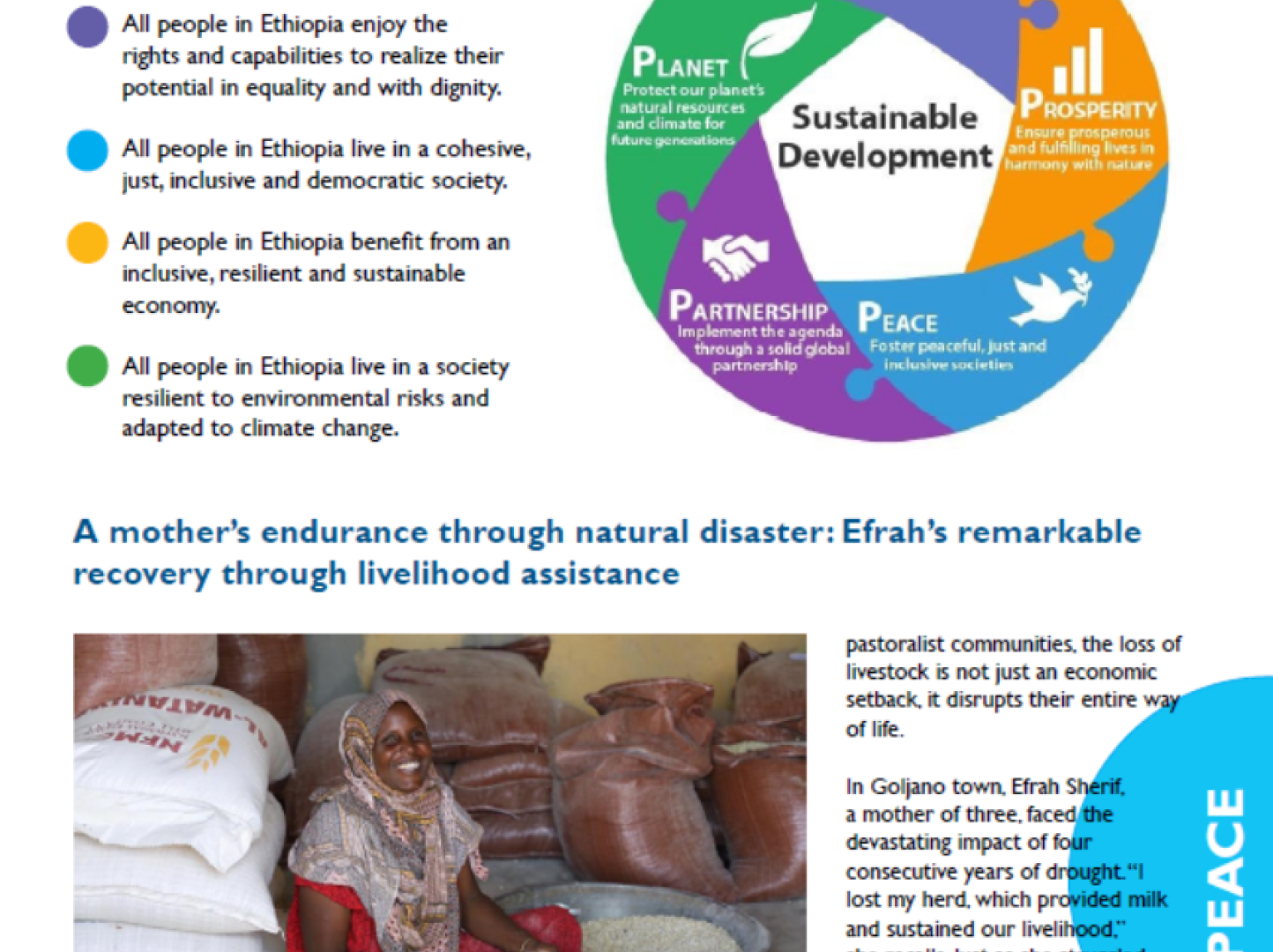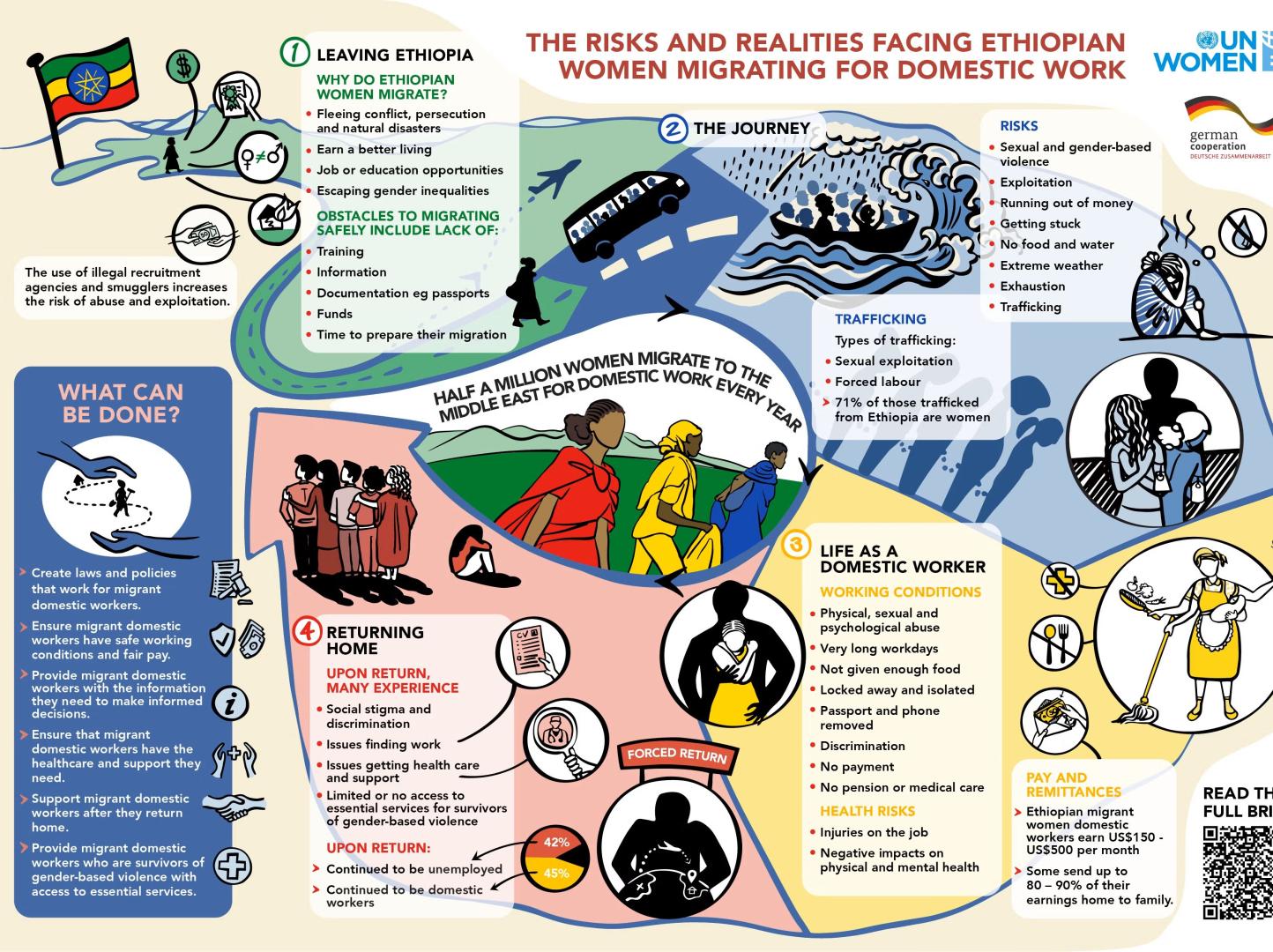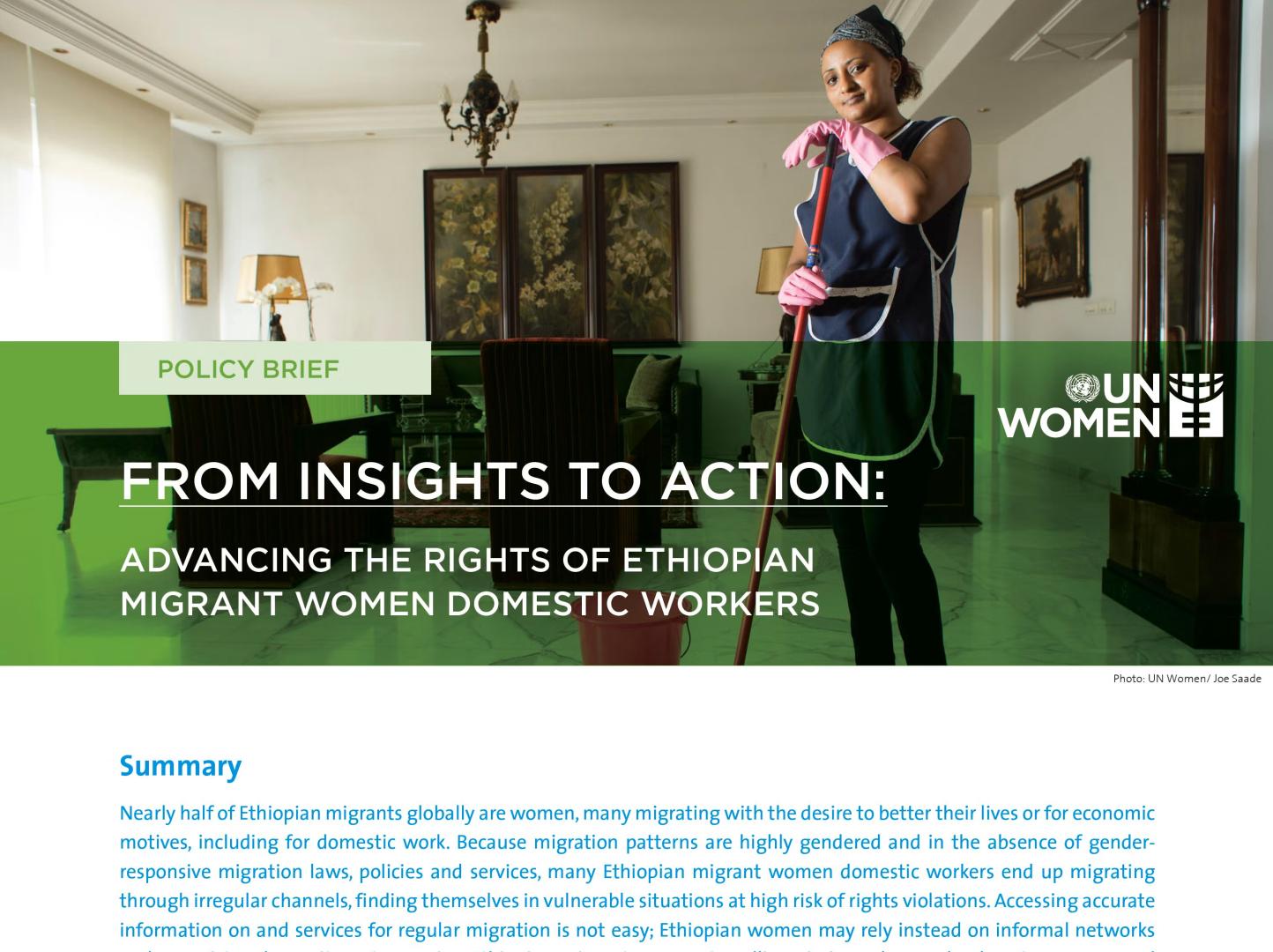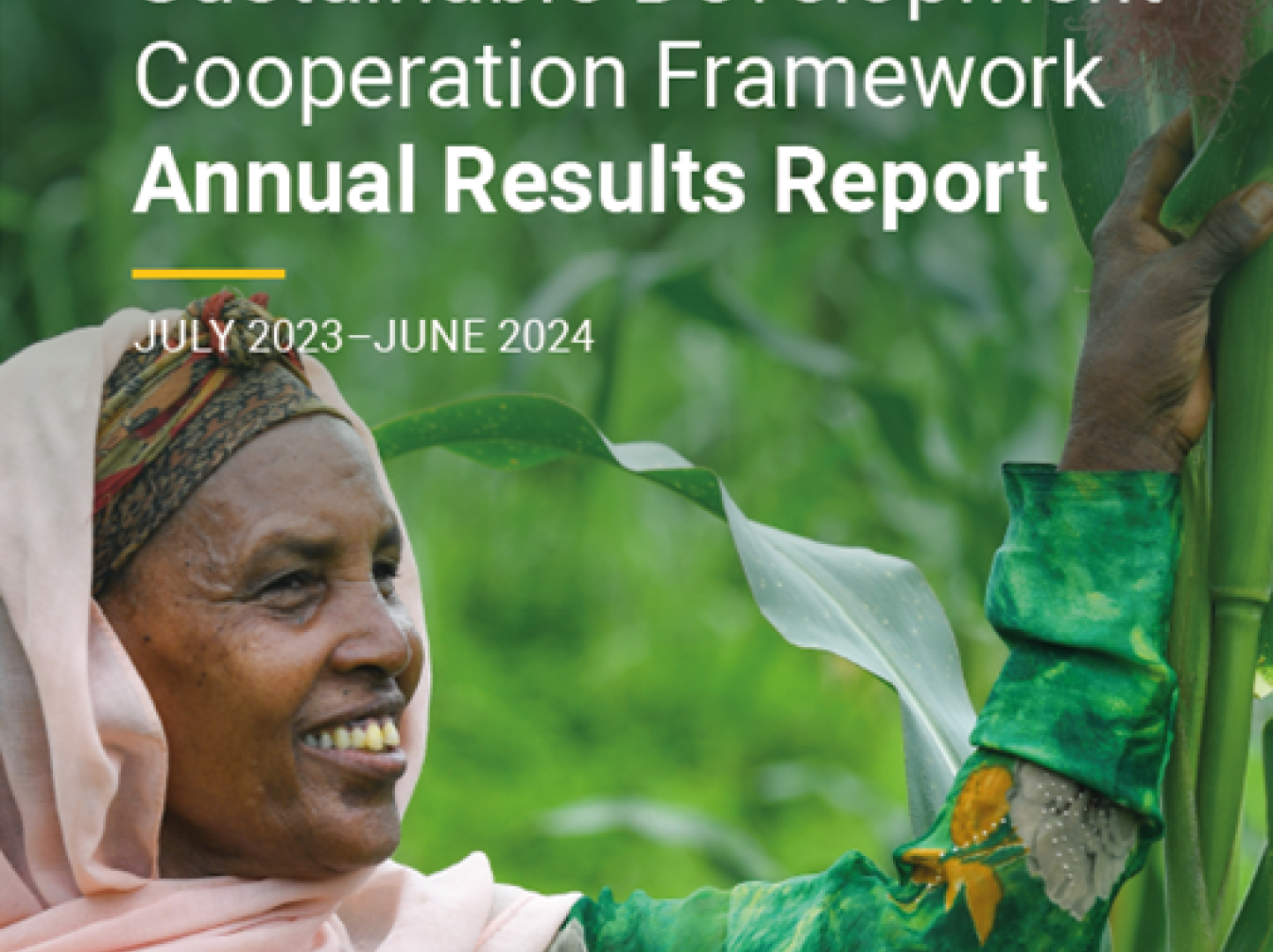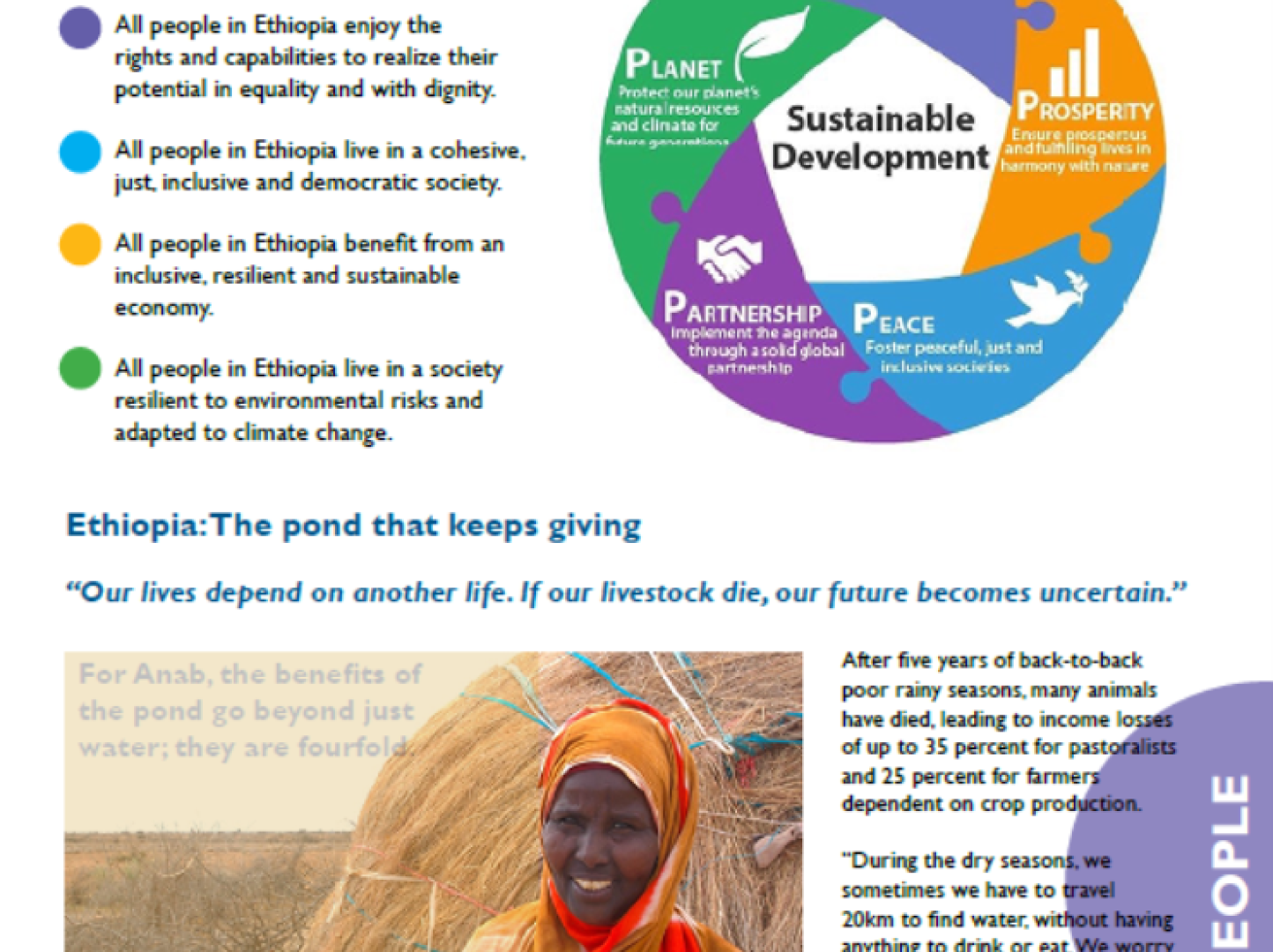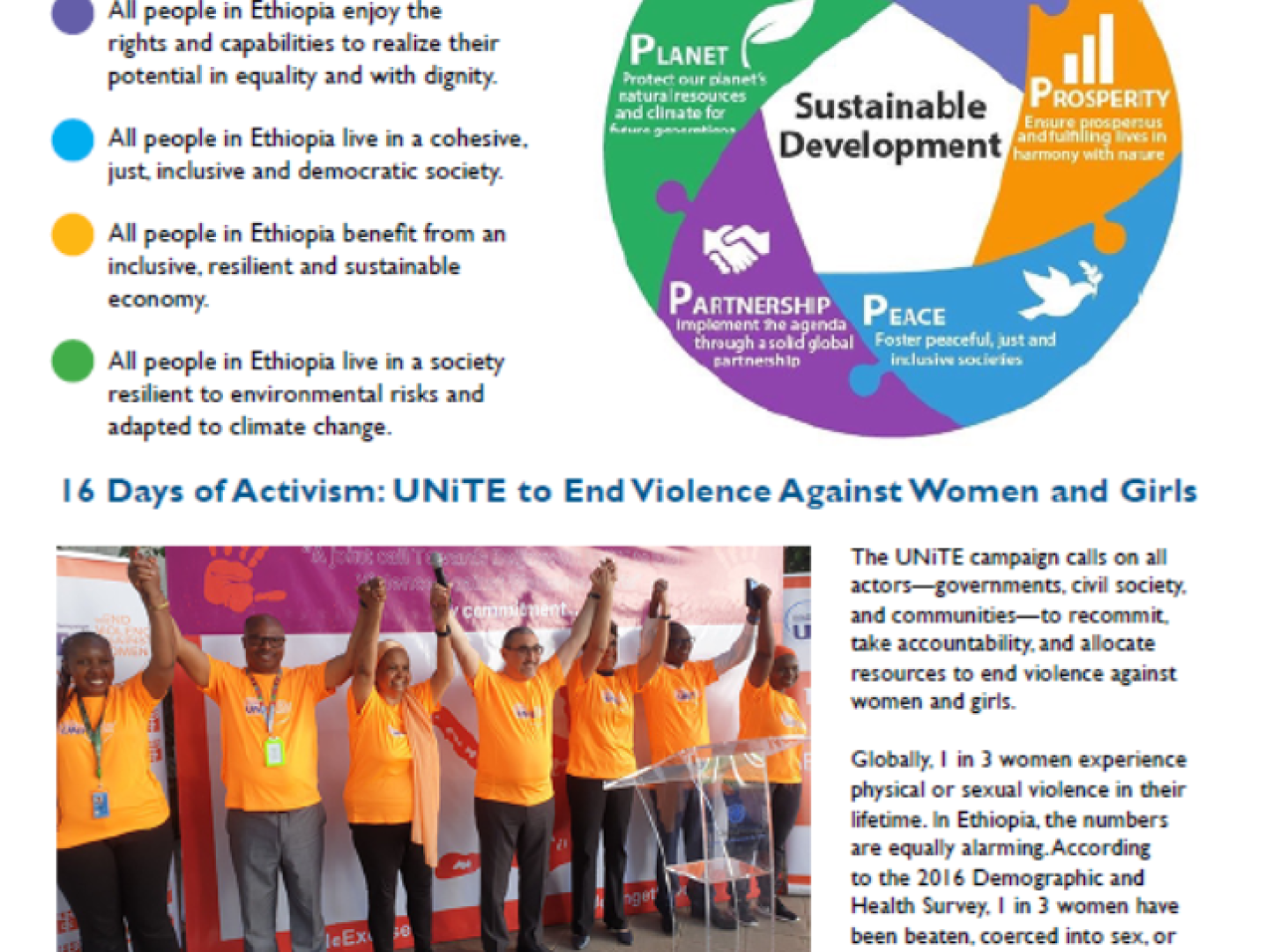Latest
Story
16 February 2026
UN Secretary-General Calls for Stronger Global Role for Africa at AU Summit
Learn more
Speech
14 February 2026
UN Secretary-General Remarks at the Second Italy-Africa Summit
Learn more
Speech
14 February 2026
UN Secretary-General's remarks at the 39th African Union Summit
Learn more
Latest
The Sustainable Development Goals in Ethiopia
The Sustainable Development Goals are a call for action by all countries – poor, rich and middle-income – to promote prosperity while protecting the planet. They recognize that ending poverty must go hand-in-hand with strategies that build economic growth and address a range of social needs including education, health, social protection, and job opportunities, while tackling climate change and environmental protection.
These are the goals the UN is working on in Ethiopia:
Story
16 February 2026
UN Secretary-General Calls for Stronger Global Role for Africa at AU Summit
UN Secretary-General António Guterres delivered an emphatic address at the 39th African Union (AU) Summit, commending the continent’s leadership in multilateralism and emphasizing the continent’s leadership in multilateralism and calling for deeper global recognition of Africa’s role in shaping the future of international governance. In his remarks, Guterres commended the African Union as a “flagship for multilateralism,” underscoring its steadfast support for cooperative global action at a time characterized by polarization and geopolitical tension. He highlighted the long-standing partnership between the UN and the AU—one built on “respect, constant dialogue, and unwavering solidarity”- and celebrated the progress the two institutions have made together in peace and security, human rights, sustainable development, and global health. A major focus of Guterres’ address was the need for overdue reform of the United Nations Security Council. He described the absence of permanent African representation as “indefensible,” stressing that decisions affecting Africa must include African voices at the highest levels. “This is 2026 — not 1946,” he declared, urging the international community to align global governance with contemporary realities.The Secretary-General also highlighted Africa’s leadership in addressing historic and structural injustices—from confronting the legacy of slavery and colonialism to championing reparatory justice frameworks. He praised African nations for driving global advocacy around climate ambition, the Sustainable Development Goals, and reforms to the international financial system. Looking ahead, Guterres outlined three priority areas for UN–AU cooperation, placing urgent emphasis on peace in conflict-affected countries. He called for an immediate cessation of hostilities in Sudan and applauded the AU’s High-Level Ad Hoc Committee for its efforts to reinvigorate political dialogue in South Sudan. These initiatives, he said, underscore Africa’s vital role in shaping peaceful, inclusive, and sustainable political transitions. The Secretary-General’s speech also reaffirmed support for the Pact for the Future and the UN80 Initiative, both shaped through substantial African leadership. These frameworks aim to strengthen UN support to Africa, enhance development cooperation, and ensure that African priorities remain central to global policymaking. As leaders concluded the summit in Addis Ababa, Guterres’ message was clear: Africa is not only a key partner in confronting global challenges but also an essential voice in reshaping the world’s multilateral architecture. His call for equity, representation, and shared responsibility reflected a broader shift toward a more inclusive international system- one in which Africa’s influence continues to grow.
1 of 5

Story
20 January 2026
Muktar’s Inspiring Journey of Recovery from the Struggles of Irregular Migration
Born in Denguro Woreda in Oromia region’s Wolega area, Muktar was forced to leave school in the eighth grade due to conflict and insecurity in his hometown.Determined to support his family, he worked on farms before moving to Addis Ababa, where he found work as a dishwasher in a hotel. However, the low income left him yearning for a better future.Encouraged by his older brother who had been living in Sudan and returned to Ethiopia, Muktar made the difficult decision to migrate irregularly in search of better work opportunities in Sudan. Alongside a friend, he set off on a journey to Sudan, where they worked as seasonal labourers harvesting crops.For four months, they toiled under the sun, but life took a devastating turn when Muktar’s identification documents were confiscated, and he was assaulted, leaving him physically and emotionally scarred.In July 2025, Muktar’s journey came to an abrupt halt when he was imprisoned and returned to Ethiopia’s Metema border post. Disoriented and distressed, he was referred to the International Organization for Migration’s (IOM) Migration Response Centre (MRC) in Metema. It was here that Muktar’s life began to pick up the broken pieces.“When I arrived at the MRC, I didn’t recognize where I was,” Muktar recalls. “I struggled with sleep disturbances, felt hopeless, and even attempted suicide. I felt profoundly lonely.”The IOM team at the MRC quickly stepped in to provide comprehensive support. Upon his arrival, Muktar was screened for vulnerabilities and protection risks. A tailored case management plan was developed to address his unique needs. Immediate nutritional support in the form of energy biscuits helped combat his hunger and exhaustion, while fresh clothing and hygiene kits restored a sense of dignity.Muktar was provided with hot meals, emergency shelter, and medical care to address his physical injuries. Recognizing the emotional toll of his experiences, the MRC also offered mental health and psychosocial support. Counseling sessions and referrals for specialized psychiatric care at Genda Wuha Hospital, funded by IOM, helped Muktar begin the process of healing.Within weeks, Muktar showed remarkable improvement. He regained stability, developed self-care skills, and found hope for the future. “With the support of IOM, I made significant progress,” he says with a smile. “Now, I have fully recovered and can take care of myself.”Muktar plans to return home with IOM’s assistance, reunite with his family, and rebuild his life. He is determined to share his story with his community to raise awareness of the risks of irregular migration.Muktar’s journey is one among countless inspiring stories of resilience supported by IOM’s Migrant Resource Centres (MRCs) in Ethiopia in 2025; made possible through the generous funding of dedicated partners such as the Norway Embassy in Addis Ababa, Canada, and the COMPASS programme through the Embassy of the Netherlands.
1 of 5

Story
18 January 2026
UNDP-Supported PCB Management in Ethiopia: Advancing Toward the Stockholm Convention Deadline
Still, their legacy continues to pose a serious threat to human health and the environment—especially in countries like Ethiopia, where older electrical infrastructure remains in use.A national inventory identified 2,435 PCB-containing transformers, with 92% (2,242 units) still in active use in Ethiopia. These transformers contain over one million kilograms of PCB-laden dielectric fluid, much of which is located in densely populated urban areas, thereby heightening the risk of contamination and exposure.The country’s PCB challenge stems largely from decades of inadequate management of obsolete electrical equipment and the absence of proper regulatory and disposal systems. Addressing this required coordinated national action—and strong global support.What are PCBs?PCBs are synthetic oily or waxy chemicals widely used in electrical equipment such as transformers, as well as in insulation materials and cooling systems. Although banned globally due to their extreme toxicity and persistence, PCBs continue to linger in the environment.As persistent organic pollutants, PCBs accumulate in soil, water, and living organisms. They move up the food chain and can cause long-term damage to the immune, reproductive, and nervous systems in both humans and wildlife. Today, the most common sources of PCB exposure are older electrical appliances that remain in operation.Ethiopia’s Commitment to Eliminating PCBs : Strengthening SystemsRecognizing the serious public health and environmental risks, Ethiopia signed the Stockholm Convention on Persistent Organic Pollutants on May 17, 2002, and ratified it shortly thereafter. As a Party to the Convention, Ethiopia committed to eliminating the use of PCBs by December 2025.To help Ethiopia meet its obligations under the Stockholm Convention, UNDP designed and implemented a PCB Management in Ethiopia – Phase I Project, running from 2019 to 2025. The project was financed with US$ 2.14 million from the Global Environment Facility (GEF), complemented with co-financing through $ 150,000 from UNDP 's #PartnersAtCore.Through this partnership, Ethiopia has achieved several major milestones:· Strengthened national legislation and regulatory frameworks.· Completion of a comprehensive National PCB Inventory. For the first time, Ethiopia has a full picture of the scale and distribution of PCB-containing equipment.· Development of a National PCB Database.· Preparation of National and Facility-Level PCB Management Plans.· Establishment of a PCB Tracking System.· Capacity building across institutions, with technical, managerial, and enforcement capacities significantly strengthened among government agencies and facility operators.Safe disposal of PCB wasteDespite global shipping disruptions, Ethiopia has successfully transported 45 tones of PCB-contaminated waste to Spain, where it has now been safely received and destroyed at specialized hazardous-waste disposal facilities. The exercise was done in accordance with the Stockholm Convention on Persistent Organic Pollutants and implemented by the European Union and Spanish regulations. The Road to 2028Eliminating the use of PCBs by December 2025 is a major milestone, but the work does not end there.The Stockholm Convention requires all Parties to ensure the environmentally sound management and final disposal of all remaining PCB liquids and contaminated equipment by 31 December 2028.This next phase will require:• Proper collection of all PCB-containing materials • Safe and compliant transport• Secure interim storage in Ethiopia• Environmentally sound treatment in Ethiopia• Final disposal by Spain in line with globally accepted best practicesEthiopia has laid a strong foundation for meeting the 2028 obligation, which calls for the country to ensure final disposal of all remaining PCB liquids and contaminated equipment by December 2028. UNDP Climate The Basel, Rotterdam and Stockh
1 of 5

Story
31 December 2025
ILO launches digital agri-business hub in Hawassa, Sidama Region of Ethiopia
The Sidama Region of Ethiopia has launched the AgriConnect Digital Agri-Business Hub, unlocking new opportunities for farmers, youth and women entrepreneurs to access real-time market information, digital advisory services, improved technologies, and stronger value-chain linkages, advancing productivity, competitiveness, and decent work across the region’s growing agribusiness sector.The Hub was jointly launched by H.E. Desta Ledamo, President of the Sidama Region, the ILO Country Director, and regional partners in collaboration with the ILO ProAgro Project, the Sidama Development Association (SDA), the Bureau of Agriculture, and the Jobs, Skills and Enterprise Development Bureau (JSEDB). The initiative forms part of a regional commitment to improve market access, drive digital transformation, and empower agripreneurs across key value chains including poultry, horticulture, and avocado.A digital platform to strengthen agribusiness and expand decent workThe new Hub combines digital tools, technical services, and enterprise support to connect farmers, SMEs, cooperatives, and service providers to real-time information and essential resources. It will offer agricultural and market data, digital advisory support, business development services, and linkages with research institutions, buyers, and input suppliers.Highlighting the regional government’s commitment to advancing digital agriculture, H.E. Desta Ledamo, President of the Sidama Region, emphasized the transformative role of the new centre. He stated: “Modernizing our agriculture requires timely information, strong market access, and improved productivity. This digital information hub plays a vital role in achieving these goals and expanding opportunities for our farmers.” “The Hub is not just a physical space — it is a collaborative platform designed to connect people, ideas, and resources,” said Khumbula Ndaba, ILO Country Director for Ethiopia Djibouti, Somalia, South Sudan and Sudan. “It will strengthen agribusiness value chains, provide access to digital technologies and real-time agricultural data, and enhance market linkages and business development services for thousands of producers and enterprises.” Innovation exhibition showcases market-ready solutionsHeld alongside the inauguration, the Sidama Agricultural Innovation Exhibition 2025 brought together more than 25 innovators, agritech firms, SMEs, cooperatives, universities, research institutes, and financial institutions. Exhibitors showcased solutions such as water-saving irrigation technologies, digital advisory tools, improved seedling systems, poultry innovations, post-harvest management tools, and market linkage models.The exhibition created a platform for farmers, youth-led and women-led enterprises, and private-sector innovators to connect through demonstrations and business-to-business sessions aimed at accelerating the adoption of promising agricultural technologies.Addressing ecosystem gaps and strengthening coordinationThe Hub responds to key gaps identified in an ILO-led entrepreneurship ecosystem assessment in Sidama, which revealed constraints such as fragmented market linkages, limited financial access, low technology uptake, and high input costs. By uniting services under one coordinated platform, AgriConnect aims to strengthen agribusiness competitiveness and support sustainable enterprise growth.Speaking on behalf of the private sector and employers’ community, Dr. Dawit Moges, First Vice President of CEEA, underscored the importance of the initiative for both agricultural transformation and job creation. He noted: “This new Agri-hub will serve as a practical engine for transformation. When technology enters the farm, productivity increases and new opportunities emerge. Digital agriculture creates roles for technicians, drone operators, service providers, and agritech entrepreneurs, giving young people dignified pathways into the economy.” He added that innovation, training, enterprise support, and digital services brought together under one roof would help farmers and cooperatives improve yields, reduce losses, and compete in local and international markets.As part of the programme, high-level officials, development partners, and technical delegates conducted a field visit to youth-led agribusiness groups in Yirgalem, including a seedling production enterprise and a growing poultry producers’ cooperative. Participants observed firsthand how improved technologies, advisory services, and market linkages supported through the ProAgro project are strengthening early-stage businesses. The visit highlighted practical examples of how digital tools, access to quality inputs, and coordinated ecosystem support are helping young entrepreneurs expand production, reduce losses, and create sustainable jobs within their communities.Looking ahead: Building a more inclusive and technology-driven futureThe launch of the Digital Agri-Business Hub marks a new step in scaling impact, strengthening value chains, and accelerating job creation. The two-day programme continues with field visits to youth-led agribusiness groups in Yirgalem, offering participants firsthand insights into the innovations driving transformation on the ground. SDG 8 Decent Work and Economic
1 of 5

Story
23 December 2025
HIV Response Meets Disability Inclusion: Advancing an Equitable Future
On 2 December 2025, UNAIDS Ethiopia, in partnership with the UN Resident Coordinator’s Office (RCO) and other UN agencies, commemorated World AIDS Day under the theme “Overcoming Disruptions, Transforming the AIDS Response” and the International Day of Persons with Disabilities with the theme “Fostering Disability-Inclusive Societies for Advancing Social Progress.”The event celebrated progress in the HIV response while emphasizing the rights, inclusion, and empowerment of persons with disabilities. It provided a platform for reflection, dialogue, and collaboration to address challenges at the intersection of HIV and disability.A panel discussion brought together UN partners, the Ministry of Health, and representatives from communities of people living with HIV (PLHIV) and persons with disabilities (PWDs). Panelists highlighted the critical need for robust data, inclusive planning, and meaningful community engagement to ensure that programs and policies truly reach those most affected.‘Communities are not merely beneficiaries’ “From a community perspective, the event was timely and highly relevant, especially given the shrinking HIV funding landscape. It created an important space to acknowledge the reality on the ground, where funding reductions are already causing service disruptions, increasing vulnerability, and creating uncertainty for people living with and affected by HIV,” says Kassahun Tadesse, Chief Executive Director, Network of Networks of HIV Positive in Ethiopia (NEP+) .The discussion underscored that communities are not merely beneficiaries but essential implementers. Inclusivity was another key takeaway, emphasizing the need to ensure meaningful engagement of PLHIV, key populations, women, and young people - including HIV-positive persons with disabilities—in funding decisions, priority setting, and transition planning.“Community voices must be involved early and continuously, rather than only consulted after decisions are made,” says Kassahun.‘Inclusion is a fundamental human right’Musie Tilahun, Executive Director, Ethiopian Lawyers with Disabilities Association (ELDA), says, “inclusion is a fundamental human right, not charity. Persons with disabilities are innovators, leaders, and catalysts for change. Yet millions continue to face barriers in education, employment, health, technology, and justice, preventing them from reaching their full potential.” “Governments, the private sector, civil society, and United Nations agencies must act decisively and collectively to remove these barriers. Building inclusive societies is not only a moral obligation but a global necessity to advance equitable progress, shared prosperity, and the full realization of human potential for all.”
1 of 5

Press Release
01 February 2026
Statement attributable to the Spokesperson for the Secretary General – on Ethiopia
The Secretary‑General is closely following developments in the Tigray region of Ethiopia, where renewed tensions and reported clashes have contributed to a worsening security environment. He is deeply concerned about the potential impact on civilians and the risk of a return to a wider conflict in a region still working to rebuild and recover.The Secretary‑General calls on all parties to exercise restraint and to resolve differences through peaceful dialogue and measures aimed at rebuilding trust. He urges the full implementation of the Permanent Cessation of Hostilities Agreement and underscores the importance of safeguarding the gains made since 2022. The Secretary‑General reiterates the Organization’s readiness to work with the African Union and regional partners to help consolidate peace in the Tigray region. Farhan Haq, Deputy Spokesperson for the Secretary-General
New York, 31 January 2026
New York, 31 January 2026
1 of 5
Press Release
12 January 2026
UN Welcomes Japan’s US$10.5 Million Contribution to Humanitarian and Development Efforts in Ethiopia
The United Nations welcomes a generous contribution of US$10.5 million (approximately ETB 1.62 billion) from the Government of Japan to support critical humanitarian response, recovery and sustainable development in Ethiopia.The contribution will be mainly channelled through UN agencies to address urgent needs arising from climate shocks and displacement, while also strengthening resilience, livelihoods and essential services for vulnerable communities. The assistance reflects Japan’s continued commitment to peace, human security and sustainable development in Ethiopia. Through this support, the UN will advance Ethiopia’s national priorities toward sustainable, people-centered development in line with the United Nations Sustainable Development Cooperation Framework (UNSDCF) and Ethiopia’s Ten-Year Development Plan. “I thank the Government and people of Japan for their unwavering generosity and steadfast commitment to Ethiopia. Their support is crucial in addressing urgent humanitarian needs and helping communities build resilience in the face of persistent challenges,” said, Dr. Aboubacar Kampo, UN Resident and Humanitarian Coordinator a.i. in Ethiopia. “Japan’s enduring commitment underscores the power of collaboration, demonstrating that innovative, people-centered solutions can create lasting change and advance Ethiopia’s path toward recovery, stability, and inclusive development,” said Dr. Kampo.The new funding package consists of two components: a Classic Package focused on humanitarian assistance, resilience and the Humanitarian–Development–Peace (HDP) Nexus, and a TICAD Package that advances innovative, co-creative development solutions aligned with the Tokyo International Conference on African Development (TICAD) process.The Classic Package, amounting to US$5.14 million, prioritizes life-saving humanitarian response, climate change resilience and recovery efforts in line with Ethiopia’s Resilient Recovery and Reconstruction Framework (3RF). In collaboration with ILO, UNFPA, UNICEF, the CBPF, ICRC and IFPRI, the package will support conflict-affected populations, internally displaced persons and host communities, while reconstructing and strengthening livelihoods, food security and protection for women and girls. The TICAD Package, valued at US$5.4 million, supports co-creative and innovative projects that bring together UN agencies and Japanese private-sector partners to boost Ethiopia’s development and resilience. FAO, UNDP, UNESCO-IICBA, UNFPA, UNHCR, UNIDO and WHO will implement this package, leveraging Japanese technology and expertise in areas such as digital health, agriculture, education, livelihoods and digital inclusion for refugees and host communities. The collaboration fosters mutually beneficial partnerships between Japan, Ethiopia and the United Nations.For media inquiries, contact:
Getachew Dibaba, Communications Officer, UN Ethiopia
Email: Getachew.Dibaba@un.org Phone: +251-911-12-52-01
Getachew Dibaba, Communications Officer, UN Ethiopia
Email: Getachew.Dibaba@un.org Phone: +251-911-12-52-01
1 of 5
Press Release
08 January 2026
Statement attributable to the Spokesperson for the Secretary-General – on US decision on withdrawal from UN entities
As we have consistently underscored, assessed contributions to the United Nations regular budget and peacekeeping budget, as approved by the General Assembly, are a legal obligation under the UN Charter for all Member States, including the United States.All United Nations entities will go on with the implementation of their mandates as given by Member States. The United Nations has a responsibility to deliver for those who depend on us. We will continue to carry out our mandates with determination.Stéphane Dujarric, Spokesman for the Secretary-GeneralNew York, 8 January 2026*****Office of the Spokesperson for the Secretary-GeneralUnited Nations
1 of 5
Press Release
22 December 2025
Restored Health and Water Services for Conflict-Affected Communities in Raya Alamata Woreda
Today, UNOPS has officially handed over rehabilitated health and WASH facilities to the community and local authorities in Raya Alamata Woreda, marking the successful completion of a critical recovery project for conflict-affected communities in Garjela and Tao kebeles.Funded by the Central Emergency Response Fund (CERF), this US$1 million project was implemented over 12 months, supporting more than 30,000 people with access to lifesaving health services and 1,462 individuals with improved access to safe water and sanitation.“This project represents a significant step in supporting the recovery and resilience of vulnerable populations in Alamata Woreda,” said Sonja Varga, UNOPS, Head of Program. “By restoring these essential services, we are helping to lay the foundation for healthier and more stable communities,” she added. The project was developed following a detailed needs assessment conducted in September 2024, which identified severe damage to infrastructure in the targeted kebeles due to conflict. The assessment highlighted looted and damaged health posts, destroyed water pumps, and compromised WASH facilities, creating urgent humanitarian needs.“CERF enables rapid, life-saving action that supports both immediate recovery and longer-term resilience in conflict-affected communities,” said Rosalind Crowther, Head of the Humanitarian Financing Unit, OCHA Ethiopia.Key outputs and impacts of the project include:1. Restored Essential Healthcare Access: The full rehabilitation and operationalization of two critical health facilities, the Gerjella Health Center and Tao Health Post has successfully restored reliable access to life-saving healthcare services for thousands of community members, removing a significant barrier to well-being.2. Ensuring Clean Water for Enhanced Public Health: The rehabilitation of institutional Water, Sanitation, and Hygiene (WASH) facilities at both health centers now ensures a dependable supply of potable water for medical staff and patients, directly elevating hygiene standards and reducing the incidence of waterborne diseases.3. Expanded Community Water Security: Rehabilitation of a key WASH facility in Tao Humo Kebele has re-established reliable, safe access to clean water for local households, strengthening daily life and improving the community’s overall resilience.4. Elevated Diagnostic and Treatment Capabilities: The provision of essential medical equipment to the rehabilitated health facilities has directly upgraded local diagnostic accuracy and treatment quality, ensuring community members receive higher-standard care without needing to travel long distances.5. Empowered Health Service Providers: By supplying new office furniture and critical IT equipment, the project has enhanced the operational capacity and professional environment for healthcare workers, enabling more efficient and effective service delivery.6. Accelerated Local Economic Recovery: Through its Cash for Work component, the project injected immediate capital into the local economy, providing vital income to participating community members while achieving essential infrastructure rehabilitations a dual benefit that spurred local recovery.7. Fostered Sustainable Community Ownership: The direct involvement of local residents in restoring their own health services has cultivated a strong sense of community ownership and responsibility for the rehabilitated facilities, a crucial factor in ensuring their long-term use and maintenance.The handover includes capacity-building support for the community structures, health facility professionals and WASH committees, local government administration offices for Health and Water, which will now be responsible for the ongoing management and maintenance of the facilities to ensure long-term sustainability.The project was implemented in close coordination with local community structures, stakeholders and aligned with broader recovery efforts.[ENDS]Notes to the editors:Press contact details:Meron Aberra, Communication Specialist, UNOPS, +251 911-221-060, Email: merons@unops.org About CERFEstablished 20 years ago, the Central Emergency Response Fund (CERF) is the United Nations’ global emergency fund managed by UN-OCHA. It provides rapid and equitable humanitarian assistance to people affected by armed conflict, natural disasters, and other emergencies. CERF allocates funding through two main windows: the Rapid Response window, which supports sudden-onset and escalating emergencies, and the Underfunded Emergencies window, which addresses critical funding gaps in protracted crises. Ethiopia has been among the top recipients of CERF funding globally since 2020, reflecting the complexity and persistence of humanitarian needs. About UNOPSUNOPS offers practical solutions across peace and security, humanitarian and development operations. We help the United Nations, governments, and other partners to manage projects and deliver sustainable infrastructure and procurement globally. Read more: www.unops.org/ethiopia
1 of 5
Press Release
24 November 2025
UNOPS and Ethiopia Sign US$8.1 Million Agreement to Enhance Rural Connectivity with New Fleet
UNOPS and the Government of Ethiopia, through its Ministry of Urban and Infrastructure (MoUI), have signed an $8.1 million agreement to procure a significant fleet of earth-moving vehicles, marking a critical step forward for the Rural Connectivity for Food Security Program.The agreement, supported by funding from the World Bank, will see UNOPS procure and deliver 88 purpose-built vehicles, including motor graders, vibratory rollers, wheel loaders, and dump trucks. This modern machinery is essential for building and maintaining rural roads, which are vital for connecting agricultural communities to markets, services, and opportunities.“By enhancing rural connectivity, we are directly contributing to increased food security and economic resilience for communities,” said Ms. Worknesh Mekonnen, Director of UNOPS Horn of Africa Multi-Country Office and representative to the African Union.The project will facilitate the construction of all-weather roads, helping to reduce transportation costs, decrease post-harvest losses for farmers, and improve access to healthcare and education. The initiative is a key component of the government’s broader strategy to strengthen the nation’s agricultural sector and rural economy.Procurement and delivery of the vehicles will be managed by UNOPS, leveraging its expertise in international public procurement. The project is scheduled for completion by November 2026. Notes to the editors: Press contact details:Meron Aberra, Communication Officer UNOPS, Tel:+251 911221060, Email: merons@unops.org About UNOPSUNOPS offers practical solutions across peace and security, humanitarian and development operations. We help the United Nations, governments, and other partners to manage projects and deliver sustainable infrastructure and procurement globally. Read more: www.unops.org/ethiopia
1 of 5
Latest Resources
1 / 11
Resources
29 April 2025
Resources
29 April 2025
1 / 11























